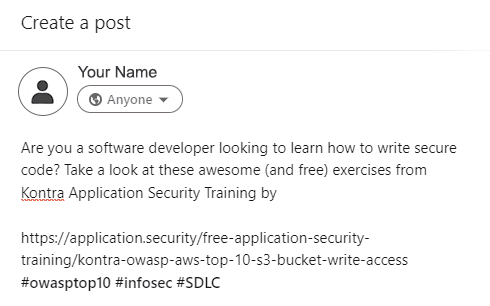Companies have always had to worry about the safety of their information. In the past, this meant physical security like locks, safety deposit boxes, and fancy alarm systems. But in today’s digital world, the biggest threats facing companies are online, requiring a different type of security.
The problem is that cybersecurity best practices manifest in consistently responsible behavior, not acing pop quizzes. Sure, the IT department and C-suite can try enforcing compliance, but true effectiveness requires an entire trained-up workforce.
But what is the best way to go about training employees in cybersecurity?
The Companywide Cybersecurity Training Program: Essentials
When considering a security awareness training program, there are a few key elements every company should bear in mind.
Whether training in-house application developers, IT staff, or the general workforce, make sure your cybersecurity training program has the following characteristics:
Delivered Frequently
To be effective, training should be an ongoing process, not a yearly obligation that ticks the compliance box. Employees should receive regular training and communication on cybersecurity best practices, updates on new threats, and refreshers on company policy.
Reaches All Employees
Cybercriminals have a way of finding the weak link. In today’s interconnected world, everyone in the company is a potential target for cybercriminals. All employees in all departments should receive cybersecurity training, whether they work in the office or remotely. Using a variety of e-learning formats will ensure that you capture the attention of all employees while keeping them engaged.
Focuses On Behavior, Not Just Technical Skills
While it is important for employees to understand the technical aspects of cybersecurity, it is equally important they understand how their behavior can impact the company’s security. Employees should be taught how to spot phishing scams, create strong passwords, have secure browsing practices, and spot potential security threats.
Includes Real-Life Simulations
The best way to learn is by doing and making mistakes. This same concept applies to both security awareness training and application security training. Employees and developers should get the opportunity to put their newly acquired skills to the test in realistic simulations of real-world cyber attacks. This will teach them what they need to do in the event of a real attack far more than any lecture or class could.
Is Up To Date
Cybersecurity is an ever-changing field where attacks today won’t be attacks tomorrow. What works today might not work tomorrow. Ensure your training program constantly evolves to keep up with the best practices amidst our current threat landscape.

How to Change Employee Behavior: Cybersecurity Edition
Even with the best training program in place, there is always the potential for human error.
It’s unlikely that employees will recall everything they’ve learned in a training course a few weeks later when they’ve resumed their daily responsibilities. Even the most well-intended employees can still make mistakes that jeopardize company security.
Want to know how to change employee behavior? First of all, you’re asking the right question. A company’s security posture will not improve until addressing employee behavior – directly, frequently and over time, to ensure safe behavior becomes core to company culture. More on this in a bit.
Pair Security Training with Security Technology
If the “human factor” carries the most cybersecurity risk, it’s important they be coached up to recognize and mitigate threats when they see them.
In the meantime, why not take care of the problem before it reaches that point? In other words, when in doubt, take it out of employee hands altogether. This means including measures like data encryption, frequently reviewed access controls, strong password policies and firewall configurations.
It’s also important to have procedures encouraging employee participation, like adding a phishing button to automate the “report suspected phishing emails” process.
Cybersecurity Workforce Training Guide: The Basics
There is no one-size-fits-all, as the best way to train employees will depend on company culture, the workforce itself, and the nature of data each employee manages. However, there are some basics every company should consider when creating a security training program:
Awareness Is Key
A study from Stanford University found that more than 90% of data breaches involve human error. That is why it is essential employees remain aware of the dangers of cyber attacks, what they look like in the real world, and what role they play in preventing them.
Make It Practical
For training to be effective in the long term, it needs to be relevant and practical. Trained employees should be able to identify and respond to threats in a way they can apply in their day-to-day work, and the training should customize to their specific roles within the company. Not every position carries the same risk.
Design An Ongoing, Long-Term Training Strategy
Simply knowing the risks is not enough; employees must always have security threats top of mind. The best way to do this is to design an ongoing training program, rather than once or twice-a-year intensive courses. This ensures employees never get rusty on the latest threats and don’t become complacent over time.
Identify High-Risk Employees And Provide More Targeted Training
Some employees will likely be more targeted than others, depending on their proximity to sensitive data. It’s important to identify these high-risk employees and provide them with more targeted training to ensure they recognize an attack when they see one.

Cybersecurity Best Practices: Make It Ongoing
A good way to do this is to implement a weekly cybersecurity bulletin, including reminders and updates on the latest threats and practical tips on how to avoid them. Implementing an employee leaderboard recognizing those following cybersecurity best practices can drive effective change.
Taking a comprehensive and multi-faceted approach to employee training creates a culture of awareness and vigilance that will go a long way in protecting company data.
One Component In a 360°, End-to-End Approach
Many companies invest substantial effort into building security training programs, but it’s important to remember that employee training is just one piece of the puzzle.
An effective security strategy must take a 360°, end-to-end approach covering all data security aspects beyond training. Today’s threat landscape requires taking a holistic approach addressing people, processes, and technology.
CISOs Get Security Training is Crucial - But Not Everything
Security awareness training is a key pillar to success, but it’s not the only thing CISOs should focus on.
That’s why ThriveDX offers an end-to-end, 360° solution to help CISOs build a comprehensive program accounting for all aspects of data security, from solving for the cybersecurity talent and skills gaps with education, recruitment and certifications, to both security awareness training and application security training for developers.
By leveraging world class experts to adopt a holistic approach to security, CISOs can build a strong defense against the constantly shifting threat landscape while ensuring their organization’s data and reputation stay intact.
To learn more about how ThriveDX protects organizations, please check out our website.
Protect Your Organization from Phishing
Explore More Resources
- Article, News
- Article, News
- Article, News
- Article, Blog
Your Trusted Source for Cyber Education
Sign up for ThriveDX's quarterly newsletter to receive information on the latest cybersecurity trends, expert takes, security news, and free resources.


